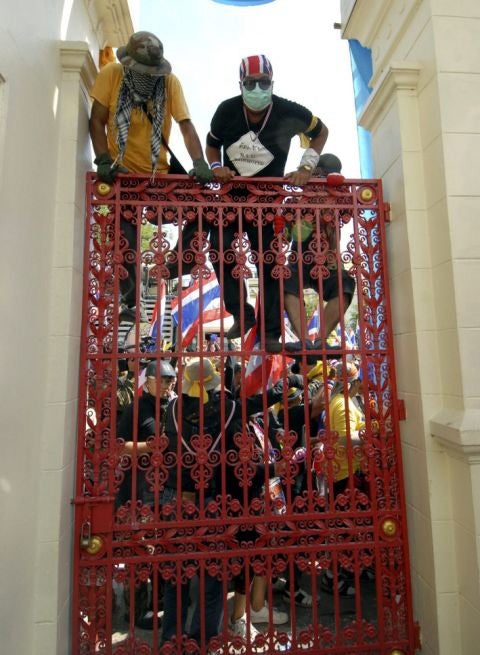Thai protesters storm army headquarters in growing attempts to topple PM Yingluck Shinawatra

Your support helps us to tell the story
From reproductive rights to climate change to Big Tech, The Independent is on the ground when the story is developing. Whether it's investigating the financials of Elon Musk's pro-Trump PAC or producing our latest documentary, 'The A Word', which shines a light on the American women fighting for reproductive rights, we know how important it is to parse out the facts from the messaging.
At such a critical moment in US history, we need reporters on the ground. Your donation allows us to keep sending journalists to speak to both sides of the story.
The Independent is trusted by Americans across the entire political spectrum. And unlike many other quality news outlets, we choose not to lock Americans out of our reporting and analysis with paywalls. We believe quality journalism should be available to everyone, paid for by those who can afford it.
Your support makes all the difference.Protesters in Thailand stormed onto the grounds of the national army headquarters on Friday, breaking into their latest high-profile target in a bid to topple Prime Minister Yingluck Shinawatra.
The crowd of about 1,200 people broke the padlocked gate at the Royal Thai Army compound and forced their way inside as they called on the military to join their anti-government campaign, said army spokesman Col. Sansern Kaewkamnerd.
The compound is next to the United Nation's Asia-Pacific headquarters in Bangkok.
"They are now gathering in the courtyard, but they have not entered buildings," Sansern said. "We will make them understand that this is a security area and we will ask them to leave."
Yingluck has been reluctant to use force to evict the opposition-led protesters for fear of escalating the country's tense political crisis and sparking bloodshed.
Security forces have done little to stop protesters who have spent the week seizing government buildings and camping out at several of them in an effort to force a government shutdown while asking civil servants to join their rally.
The demonstrations that started Sunday have raised fears of fresh political turmoil and instability in Thailand and pose the biggest threat to Yingluck's administration since she came to power in 2011.
The protesters accuse Yingluck of serving as a proxy for her billionaire brother Thaksin Shinawatra, a former prime minister who was ousted in a 2006 military coup but retains strong support from the rural majority in Thailand.
Protesters branched out to several spots on Friday, with another crowd staging a rally outside the headquarters of Yingluck's ruling Pheu Thai Party, where hundreds of riot police stood guard to prevent them from entering.
A separate crowd of more than 1,000 people marched through central Bangkok to the U.S. Embassy to convey the protesters' message that Yingluck's leadership is illegitimate, in response to a statement from Washington that expressed concern about the protests.
Crowd sizes peaked Sunday at over 100,000 and have dwindled in recent days to tens of thousands, but organizers have kept each day dramatic by targeting new and different seats of power.
Crowds of protesters have occupied the Finance Ministry since Monday and others have remained holed up since Wednesday at a sprawling government complex that houses the Department of Special Investigations, the country's equivalent of the FBI. On Thursday, the demonstrators cut power at Bangkok's police headquarters and asked police to join their side.
Yingluck has publicly pleaded for the protesters to stop and asked leaders of the movement to negotiate.
"Please call off the protests for the country's peace," Yingluck said Thursday. "I'm begging you."
But protest leader Suthep Thaugsuban, who resigned as an opposition Democrat Party lawmaker to lead the protests, says he will not negotiate. He says his goal to rid the country of Thaksin's influence and to appoint a new leader chosen by an appointed "people's council."
Suthep has called for bigger crowds to join the campaign over the weekend.
Thaksin, who lives in Dubai to avoid serving a jail term for a corruption conviction he says was politically motivated, is a highly polarizing figure in Thailand. So much so, that an ill-advised bid to push a general amnesty law through parliament — which would have paved the way for his return — sparked the latest wave of protests earlier this month.
Before Thaksin was toppled in a coup — allegedly for corruption, abuse of power and insulting the nation's revered king — he won over Thailand's rural underclass by introducing populist policies designed to benefit the poor. His political movement grew to become the most successful in modern Thai history.
But his opponents, largely members of the urban middle class and elite, saw him as arrogant and a threat to democracy and their own privileges. The country has been gripped by alternating protests from both sides since 2006.
AP
Subscribe to Independent Premium to bookmark this article
Want to bookmark your favourite articles and stories to read or reference later? Start your Independent Premium subscription today.
Join our commenting forum
Join thought-provoking conversations, follow other Independent readers and see their replies
Comments